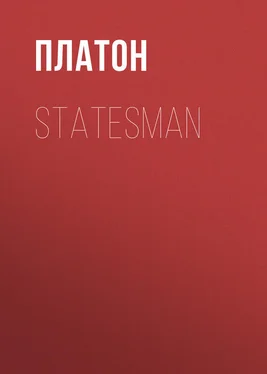Платон - Statesman
Здесь есть возможность читать онлайн «Платон - Statesman» — ознакомительный отрывок электронной книги совершенно бесплатно, а после прочтения отрывка купить полную версию. В некоторых случаях можно слушать аудио, скачать через торрент в формате fb2 и присутствует краткое содержание. Жанр: Философия, foreign_antique, foreign_prose, на английском языке. Описание произведения, (предисловие) а так же отзывы посетителей доступны на портале библиотеки ЛибКат.
- Название:Statesman
- Автор:
- Жанр:
- Год:неизвестен
- ISBN:нет данных
- Рейтинг книги:5 / 5. Голосов: 1
-
Избранное:Добавить в избранное
- Отзывы:
-
Ваша оценка:
- 100
- 1
- 2
- 3
- 4
- 5
Statesman: краткое содержание, описание и аннотация
Предлагаем к чтению аннотацию, описание, краткое содержание или предисловие (зависит от того, что написал сам автор книги «Statesman»). Если вы не нашли необходимую информацию о книге — напишите в комментариях, мы постараемся отыскать её.
Statesman — читать онлайн ознакомительный отрывок
Ниже представлен текст книги, разбитый по страницам. Система сохранения места последней прочитанной страницы, позволяет с удобством читать онлайн бесплатно книгу «Statesman», без необходимости каждый раз заново искать на чём Вы остановились. Поставьте закладку, и сможете в любой момент перейти на страницу, на которой закончили чтение.
Интервал:
Закладка:
The outline may be filled up as follows: —
SOCRATES: I have reason to thank you, Theodorus, for the acquaintance of Theaetetus and the Stranger.
THEODORUS: And you will have three times as much reason to thank me when they have delineated the Statesman and Philosopher, as well as the Sophist.
SOCRATES: Does the great geometrician apply the same measure to all three? Are they not divided by an interval which no geometrical ratio can express?
THEODORUS: By the god Ammon, Socrates, you are right; and I am glad to see that you have not forgotten your geometry. But before I retaliate on you, I must request the Stranger to finish the argument…
The Stranger suggests that Theaetetus shall be allowed to rest, and that Socrates the younger shall respond in his place; Theodorus agrees to the suggestion, and Socrates remarks that the name of the one and the face of the other give him a right to claim relationship with both of them. They propose to take the Statesman after the Sophist; his path they must determine, and part off all other ways, stamping upon them a single negative form (compare Soph.).
The Stranger begins the enquiry by making a division of the arts and sciences into theoretical and practical – the one kind concerned with knowledge exclusively, and the other with action; arithmetic and the mathematical sciences are examples of the former, and carpentering and handicraft arts of the latter (compare Philebus). Under which of the two shall we place the Statesman? Or rather, shall we not first ask, whether the king, statesman, master, householder, practise one art or many? As the adviser of a physician may be said to have medical science and to be a physician, so the adviser of a king has royal science and is a king. And the master of a large household may be compared to the ruler of a small state. Hence we conclude that the science of the king, statesman, and householder is one and the same. And this science is akin to knowledge rather than to action. For a king rules with his mind, and not with his hands.
But theoretical science may be a science either of judging, like arithmetic, or of ruling and superintending, like that of the architect or master-builder. And the science of the king is of the latter nature; but the power which he exercises is underived and uncontrolled, – a characteristic which distinguishes him from heralds, prophets, and other inferior officers. He is the wholesale dealer in command, and the herald, or other officer, retails his commands to others. Again, a ruler is concerned with the production of some object, and objects may be divided into living and lifeless, and rulers into the rulers of living and lifeless objects. And the king is not like the master-builder, concerned with lifeless matter, but has the task of managing living animals. And the tending of living animals may be either a tending of individuals, or a managing of herds. And the Statesman is not a groom, but a herdsman, and his art may be called either the art of managing a herd, or the art of collective management: – Which do you prefer? 'No matter.' Very good, Socrates, and if you are not too particular about words you will be all the richer some day in true wisdom. But how would you subdivide the herdsman's art? 'I should say, that there is one management of men, and another of beasts.' Very good, but you are in too great a hurry to get to man. All divisions which are rightly made should cut through the middle; if you attend to this rule, you will be more likely to arrive at classes. 'I do not understand the nature of my mistake.' Your division was like a division of the human race into Hellenes and Barbarians, or into Lydians or Phrygians and all other nations, instead of into male and female; or like a division of number into ten thousand and all other numbers, instead of into odd and even. And I should like you to observe further, that though I maintain a class to be a part, there is no similar necessity for a part to be a class. But to return to your division, you spoke of men and other animals as two classes – the second of which you comprehended under the general name of beasts. This is the sort of division which an intelligent crane would make: he would put cranes into a class by themselves for their special glory, and jumble together all others, including man, in the class of beasts. An error of this kind can only be avoided by a more regular subdivision. Just now we divided the whole class of animals into gregarious and non-gregarious, omitting the previous division into tame and wild. We forgot this in our hurry to arrive at man, and found by experience, as the proverb says, that 'the more haste the worse speed.'
And now let us begin again at the art of managing herds. You have probably heard of the fish-preserves in the Nile and in the ponds of the Great King, and of the nurseries of geese and cranes in Thessaly. These suggest a new division into the rearing or management of land-herds and of water-herds: – I need not say with which the king is concerned. And land-herds may be divided into walking and flying; and every idiot knows that the political animal is a pedestrian. At this point we may take a longer or a shorter road, and as we are already near the end, I see no harm in taking the longer, which is the way of mesotomy, and accords with the principle which we were laying down. The tame, walking, herding animal, may be divided into two classes – the horned and the hornless, and the king is concerned with the hornless; and these again may be subdivided into animals having or not having cloven feet, or mixing or not mixing the breed; and the king or statesman has the care of animals which have not cloven feet, and which do not mix the breed. And now, if we omit dogs, who can hardly be said to herd, I think that we have only two species left which remain undivided: and how are we to distinguish them? To geometricians, like you and Theaetetus, I can have no difficulty in explaining that man is a diameter, having a power of two feet; and the power of four-legged creatures, being the double of two feet, is the diameter of our diameter. There is another excellent jest which I spy in the two remaining species. Men and birds are both bipeds, and human beings are running a race with the airiest and freest of creation, in which they are far behind their competitors; – this is a great joke, and there is a still better in the juxtaposition of the bird-taker and the king, who may be seen scampering after them. For, as we remarked in discussing the Sophist, the dialectical method is no respecter of persons. But we might have proceeded, as I was saying, by another and a shorter road. In that case we should have begun by dividing land animals into bipeds and quadrupeds, and bipeds into winged and wingless; we should than have taken the Statesman and set him over the 'bipes implume,' and put the reins of government into his hands.
Here let us sum up: – The science of pure knowledge had a part which was the science of command, and this had a part which was a science of wholesale command; and this was divided into the management of animals, and was again parted off into the management of herds of animals, and again of land animals, and these into hornless, and these into bipeds; and so at last we arrived at man, and found the political and royal science. And yet we have not clearly distinguished the political shepherd from his rivals. No one would think of usurping the prerogatives of the ordinary shepherd, who on all hands is admitted to be the trainer, matchmaker, doctor, musician of his flock. But the royal shepherd has numberless competitors, from whom he must be distinguished; there are merchants, husbandmen, physicians, who will all dispute his right to manage the flock. I think that we can best distinguish him by having recourse to a famous old tradition, which may amuse as well as instruct us; the narrative is perfectly true, although the scepticism of mankind is prone to doubt the tales of old. You have heard what happened in the quarrel of Atreus and Thyestes? 'You mean about the golden lamb?' No, not that; but another part of the story, which tells how the sun and stars once arose in the west and set in the east, and that the god reversed their motion, as a witness to the right of Atreus. 'There is such a story.' And no doubt you have heard of the empire of Cronos, and of the earthborn men? The origin of these and the like stories is to be found in the tale which I am about to narrate.
Читать дальшеИнтервал:
Закладка:
Похожие книги на «Statesman»
Представляем Вашему вниманию похожие книги на «Statesman» списком для выбора. Мы отобрали схожую по названию и смыслу литературу в надежде предоставить читателям больше вариантов отыскать новые, интересные, ещё непрочитанные произведения.
Обсуждение, отзывы о книге «Statesman» и просто собственные мнения читателей. Оставьте ваши комментарии, напишите, что Вы думаете о произведении, его смысле или главных героях. Укажите что конкретно понравилось, а что нет, и почему Вы так считаете.










